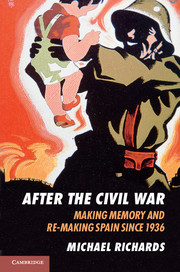Book contents
- Frontmatter
- Contents
- List of maps and tables
- Preface
- Acknowledgements
- Maps
- Introduction: cultural trauma in Spain
- Part I Setting the scene
- Part II Memories of war during the Franco years
- Part III Memories of war after Franco
- Conclusion: the history of war memories in Spain
- Glossary and abbreviations
- Sources and select bibliography
- Index
- References
Conclusion: the history of war memories in Spain
Published online by Cambridge University Press: 05 June 2013
- Frontmatter
- Contents
- List of maps and tables
- Preface
- Acknowledgements
- Maps
- Introduction: cultural trauma in Spain
- Part I Setting the scene
- Part II Memories of war during the Franco years
- Part III Memories of war after Franco
- Conclusion: the history of war memories in Spain
- Glossary and abbreviations
- Sources and select bibliography
- Index
- References
Summary
In the light of debates since the death of Franco about the legacy of war and dictatorship, the redressing of past wrongs, and the role of public history, this study has sought to explain the relationship between multiple memory narratives of the Spanish civil war. An understanding of the aftermath of the civil war and the regime to which it gave rise has been outlined which delineates the connections between the devastation and dislocation of the conflict and later processes of change. The objective has been to integrate the phases of Francoism more effectively than has previously been achieved by exploring social change and social memory decade by decade, from the ground up (in the even-numbered chapters, 2–10), interspersed – again, chronologically – with the politics and practices of memory of the victors (in the odd-numbered chapters, 3–9). Collective articulation of war memories depended primarily on the violence of the conflict but was also in large measure contingent, shaped by post-war events and changing social circumstances. Memory corresponded to present political and social requirements and collectively constructed ways of explaining the relation between ‘then’ and ‘now’. This extended account of changes in memory over time during Franco's dictatorship serves as the essential context for analysis in the final two chapters, 11 and 12, of recent debates about the recuperation of historical memory. Current concerns are placed alongside the modernisation of society after Franco, the retreat of the nation-state, and uncertainties about collective identity.
- Type
- Chapter
- Information
- After the Civil WarMaking Memory and Re-Making Spain since 1936, pp. 359 - 365Publisher: Cambridge University PressPrint publication year: 2013

